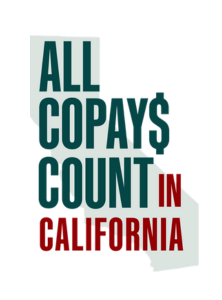
All Copays Count in California Coalition Applauds AB 2180
Summary
Today, over 80 national and California-based advocacy organizations that make up the All Copays Count in California Coalition applauded the introduction of Assembly Bill 2180, state legislation that protects chronically or terminally ill patient access to prescription medications. Introduced by Assemblymember Akilah Weber, M.D. (D-79), AB 2180 would ensure that California health insurance plans and pharmacy benefit mangers (PBMs) count the value of copay assistance from patient assistance programs (PAPs) toward a patient’s deductible and out-of-pocket maximum expenses, thereby banning the growing practice of copay accumulators used by health plans and PBMs to deny patient cost-sharing assistance.
Press Release
All Copays Count in California Coalition Applauds AB 2180
Over 80 National & California-Based Patient & Provider Advocacy Groups Applaud Introduction of Legislation to Protect Patient Assistance in California
Assembly Bill 2180 Would Ensure California Health Plans and Pharmacy Benefit Managers (PBMs) Count Copay Assistance Towards Patient Cost-Sharing Requirements
SACRAMENTO, CA, February 2, 2024 – Today, over 80 national and California-based advocacy organizations that make up the All Copays Count in California Coalition applauded the introduction of Assembly Bill 2180, state legislation that protects chronically or terminally ill patient access to prescription medications. Introduced by Assemblymember Akilah Weber, M.D. (D-79), AB 2180 would ensure that California health insurance plans and pharmacy benefit mangers (PBMs) count the value of copay assistance toward a patient’s deductible and out-of-pocket maximum expenses, thereby banning the growing practice of copay accumulators used by health plans and PBMs to deny patient cost-sharing assistance.
“The All Copays Count in California Coalition commends Dr. Weber for championing legislation that will improve patient access to medications and protect the most vulnerable Californians from harmful and deceptive insurance schemes that raise patient costs,” said Lynne Kinst, Executive Director of Hemophilia Council of California, which is a cosponsor of the bill.
“Treatment decisions should remain between a patient and their healthcare provider and should not be impacted by insurance and PBM schemes,” said the bill’s author, Assemblymember Akilah Weber, M.D., adding “Assembly Bill 2180 would protect patients from harmful copay accumulator policies and ensure Californians can access and afford the critical treatments they need to manage complex and chronic conditions.”
“Assembly Bill 2180 is critical to allow patients to access medications that sometimes represent the only treatment that can help them control their disease,” said Dr. Samy Metyas, president of California Rheumatology Alliance. “For many of these patients, generic or biosimilar options are simply not available.”
“Today, about half of commercial health plans in California include copay accumulator policies that don’t count the value of copay assistance towards a patient’s cost-sharing requirements, even while they accept the third-party payment for their own profit,” said Kelly Goss, Managing Director, Advocacy, of the ALS Association, another cosponsor of this important legislation.
“Our Coalition is proud to work with Assemblymember Weber to advance AB 2180 to protect California’s chronically and terminally ill communities from this practice” added Mary Brown, President and Chief Executive Officer of the Sickle Cell Disease Foundation, which is also a cosponsor of the bill.
According to one study, 70% of patients abandon their prescription medications when their out-of-pocket costs reach $250 or more, endangering patient health and quality of life.
“Chronic and terminal illnesses create tremendous financial challenges for patients and their families. When insurers utilize copay accumulator policies which do not count third-party payment towards the deductible or out-of-pocket maximum, patients often cannot afford their medications, which has serious health implications. We are hopeful the California Legislature will pass Assemblymember Weber’s legislation to ban the harmful practice in California,” said Siri Vaeth, Executive Director of the Cystic Fibrosis Research Institute, which is also cosponsors the bill.
To date, 19 states, Washington, DC, and Puerto Rico have passed legislation that requires health insurers to count the value of copay assistance towards patient cost-sharing responsibilities, including Arizona, Arkansas, Colorado, Connecticut, Delaware, Georgia, Illinois, Kentucky, Louisiana, Maine, New Mexico, New York, North Carolina, Oklahoma, Tennessee, Texas, Virginia, Washington, and West Virginia. An analysis from the Global Healthy Living Foundation (GHLF) found that the rate of health insurance premium increases have not changed since the passage of state laws requiring that patient assistance funds count toward patients’ or policy holders’ deductibles or out-of-pocket maximum payments.
###
About The All Copays Count in California Coalition
All Copays Count in California is a coalition of community-based organizations, patient advocacy groups and healthcare providers from across the state concerned about the devastating impact that the use of copay accumulators has on the most vulnerable patients, including underinsured individuals and patients with chronic or terminal conditions who rely on multiple medications to manage their illness.